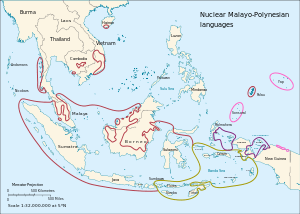Nuclear Malayo-Polynesian languages
| Nuclear Malayo-Polynesian | |
|---|---|
| Geographic distribution: | South East Asia and the Pacific |
| Linguistic classification: |
|
| Subdivisions: |
|
| Glottolog: | None |
|
The principal branches of the Nuclear Malayo-Polynesian languages:
| |
The Nuclear Malayo-Polynesian languages are a branch of the Austronesian family, proposed by Wouk & Ross (2002), that are thought to have dispersed from a possible homeland in Sulawesi. They are called nuclear because they are the conceptual core of the Malayo-Polynesian family, including both Malay and Polynesian. Nuclear Malayo-Polynesian is found throughout Indonesia (apart from central Borneo, Sabah, and the north of Sulawesi), and into Melanesia and the Pacific.
Nuclear Malayo-Polynesian languages are Malayo-Polynesian languages that have abandoned the Austronesian alignment inherited from Proto-Malayo-Polynesian syntax. Nuclear Malayo-Polynesian includes the traditional geographic groupings of Central Malayo-Polynesian, Eastern Malayo-Polynesian, and part of Western Malayo-Polynesian, a part Wouk and Ross call Inner Western Malayo-Polynesian or Sunda–Sulawesi. Nuclear Malayo-Polynesian excludes the Outer Western Malayo-Polynesian (Borneo–Philippine) languages.
Inner Western Malayo-Polynesian (Sunda–Sulawesi) is therefore defined negatively, as those languages of Sunda and Sulawesi not included in Central–Eastern Malayo-Polynesian. Central–Eastern is an areal group, divergent from the rest of Malayo-Polynesian due to non-Austronesian (Papuan) substrata rather than due to any genealogical relationship.
Classification
There are a number of small clusters of languages whose interrelationship remains uncertain. Grouped by geography, they are:
- Central and southern Sulawesi
- Celebic languages: poorly supported as a clade.
- South Sulawesi languages: includes the Buginese language; and perhaps the Tamanic languages.
- Greater Sunda Islands
- Moken language: of the Burmese coast.
- Northwest Sumatran languages: of north-central Sumatra and the Mentawai Islands. It is unclear if it includes the Enggano language.
- Malayo-Sumbawan languages: of Sumatra, Java, Borneo, and Vietnam. Includes the Malay language, the Sundanese language, and the Balinese language.
- Lampungic languages: of southeastern Sumatra. It might include the Sundanese language.
- Javanese language: of central and eastern Java.
- Western Pacific islands
- Palauan language: of Palau.
- Chamorro language: of the Mariana Islands, including Guam. It might be a Philippine language.
- Moluccas, New Guinea, Oceania
- Central–Eastern Malayo-Polynesian languages.
- Central Malayo-Polynesian languages.
- Sumba–Flores languages, spoken on and around the islands of Sumbawa (eastern), Sumba, and western–central Flores in the Lesser Sundas.
- Flores–Lembata languages, spoken in the Lesser Sundas, on eastern Flores and small islands immediately east of Flores.
- Selaru languages, spoken in the Tanimbar Islands of Indonesia.
- Kei–Tanimbar languages, spoken in the Kei and Tanimbar Islands of the southern Malukus, and on the north side of the Bomberai Peninsula.
- Aru languages, spoken on the Aru Islands in Indonesia.
- Central Maluku languages, spoken principally on the Seram, Buru, Ambon, Kei, and the Sula Islands.
- Timoric, or Timor–Babar, languages, spoken on the islands of Timor, neighboring Wetar, and (depending on the classification) the Babar Islands to the east.
- Kowiai language, spoken on the Bomberai Peninsula in New Guinea.
- Teor-Kur language, spoken near Kei Island, Indonesia.
- Eastern Malayo-Polynesian languages.
- Halmahera–Cenderawasih languages, found in the islands and along the shores of the Halmahera Sea in the Indonesian province of North Maluku and of Cenderawasih Bay in the provinces of Papua and West Papua.
- Oceanic languages, spoken in Polynesia, as well as much of Melanesia and Micronesia.
- Central Malayo-Polynesian languages.
The position of Rejang in southwest Sumatra and newly discovered Nasal are as yet uncertain. Rejang may be a displaced Bornean Dayak language, and not Nuclear Malayo-Polynesian at all.
Notes
References
- Fay Wouk and Malcolm Ross (ed.), 2002, The history and typology of western Austronesian voice systems. Australian National University.
- K. Alexander Adelaar and Nikolaus Himmelmann, 2005, The Austronesian languages of Asia and Madagascar. Routledge.
- Austronesian Basic Vocabulary Database
